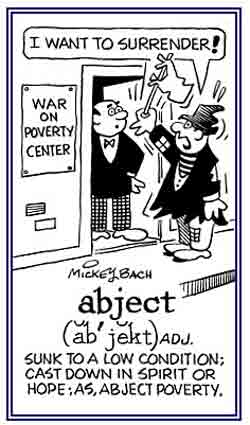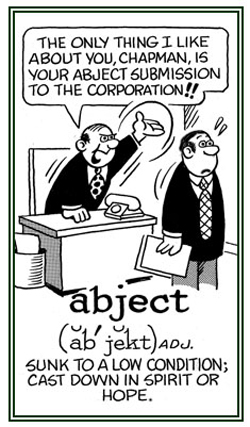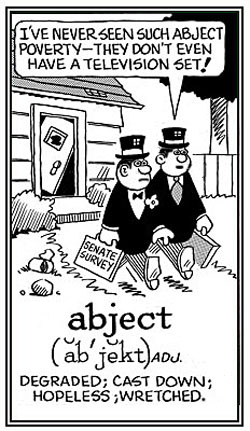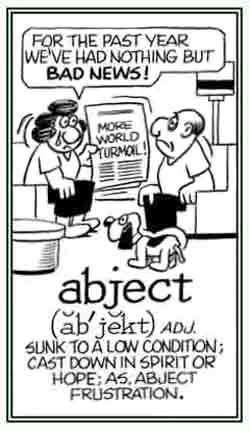jet-, -ject, -jecting, -jected, -jection, -jector, -jectory; jacu-, jac-
(Latin: throw, send, fling, hurl, cast; gush; spurt)
Walter's aunt was in an abject mood brought on by the secret knowledge that her hero was in fact an abject wimp with feet of clay.
The old couple have been living in abject poverty since their pensions were reduced.
2. Concerning the most miserable kind, wretched; descriptive of the absolute worst or most extreme thing: Since the flood, Kristin's friends have been living in an abject situation as they try to clean up the mud in their house, get rid of and replace furniture that can no longer be used, and fix other damages done to their house.Tracie and her two children have been trying to survive in her old car for over a month under the most abject conditions, including being without toilet facilities, not having enough food or water, etc., etc.
3. Etymology: a transition from the literal to the figurative, and from cause to effect, has occurred in the meaning of abject. ab-, meaning "off, away", and jacere, meaning "to throw", were combined in Latin to form abjicere, "to throw away", with a past participle abjectus, "thrown away".Directly from this source came the English word abject, which was formerly not only an adjective but also a verb meaning "to cast off, to throw down", and with a figurative application, "to degrade".
It is this latter meaning that survives in the Modern English adjective abject which characterizes someone who has been cast off or degraded and who is therefore low in condition or cast down in spirit.
2. A condition of being servile, wretched, or contemptible: In school, the students studied the various abjections of human situations and learned strategies that would help them to avoid miserable lives in the future.
Jeffrey sighed and abjectly walked away after being exposed as a swindler.
2. Regarding how a situation is handled in a hopeless resigned manner: Joshua abjectly shrugged his shoulders when his wife started another session of complaining.
Go to this Word A Day Revisited Index
for a list of other images which you can enjoy.
2. The submissiveness or fawning in attitude or behavior: Terri's abjectness revealed that she was so servile and overly willing to serve or to obey other people that no one respected her.
"Without adjectivals, much of the color in language would be lost and these words allow people to describe in more detail the nouns and pronouns about which they are speaking or writing."
"Adjectivals modify nouns and pronouns by providing information that answers the following questions about nouns or pronouns: What kind? Which one? How many? or How much?"
2. Any member of a class of words that, in many languages, are distinguished in form, as partly in English, and which have comparative and superlative endings: Adjectives function as modifiers of nouns, such as "good", "wise", "perfect", "beautiful", "bad", "sad", "loud", etc.
The three most common adjectives are the articles: "a", "an", and "the". The "a" and "an" are the indefinite articles and refer to any one of a class of nouns. "The" is a definite article that refers to a specific noun.
Examples of the indefinite articles, or adjectives, are "a contest", and "an opportunity". A definite article sample is "the writer".
Used in grammar when referring to a modifier (descriptive word/words) of a noun or a pronoun.
A geomagnetic perturbation (confusion or disorder) lasting one to two hours, which tends to occur during a local post-midnight time.
The magnitude of the substorm is largest in the auroral zone and corresponds to an injection of charged particles from the magnetotail into the auroral oval.




